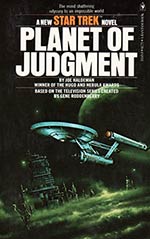
![]() Thomcat
Thomcat
6/25/2022
![]()
An interesting situation, a too-strong villain, impossibilities with physics and dumb choices by the crew make for mixed bag of a novel. It's a quick read, but unsatisfying.
Haldeman was asked to write a Star Trek novel when James Blish bowed out, and that author was referenced in one of the minor characters (Professor Atheling, a pen-name used by Blish). He hadn't seen the show or read any other materials, and ended up using a discussion with Roddenberry and a few photocopied scripts as reference. The characters aren't bad, though they make some un-starfleet choices when dealing with impossible physics.
It does make me wonder whether technicians do transporter "tests" on new worlds first - the crew steps on the pad here and... nothing happens, which is a lot better than other types of failure!
The world itself is a bit mad, with tall grass and a ridiculous biome - but that is nothing compared to the violations of physics. The transporter doesn't work, phaser "stun" is fine but not "kill", the shuttles can land fine but the engines then cease to function; and worst of all, no communications? Yes, in the end this comes back to a too-powerful alien species who "doesn't like the noise", but seriously? The world itself is ridiculous, not part of a planetary system and orbiting a somewhat controlled black hole. I can't see star fleet that we know of dipping a toe into that planet before they understood the physics of the space around it, and that includes the prime directive. An author more knowledgeable of the canon could have had their too-powerful alien "hide" information and fool the sensors, etc.
That's the first 3/4 of the book, and then everything changes and the story finally connects to the title (which Haldeman states on his blog "wasn't his title" - so where did it come from?). This second section has nothing to do with the first, and has the too-powerful alien "testing" a portion of the crew. "Q" anyone?
Was this ending handed to Haldeman to incorporate (badly) into his story? Did someone make liberal "edits" with the ending after he submitted the manuscript? I've read Haldeman before and while the first part feels true, the ending doesn't. Did Roddenberry have some sort of a fascination with god-like powers testing the crew?
I look forward to more from this author, but not the later Star Trek book he wrote (World Without End). To quote the author from his blog, "But once I'd proved that I could write a novel with somebody else's characters, the prospect of doing it a second time was not attractive. I'd signed a two-book contract, though, and Paramount wouldn't let me buy it back. The second took three times as long and was a little less painful than pulling your own teeth."